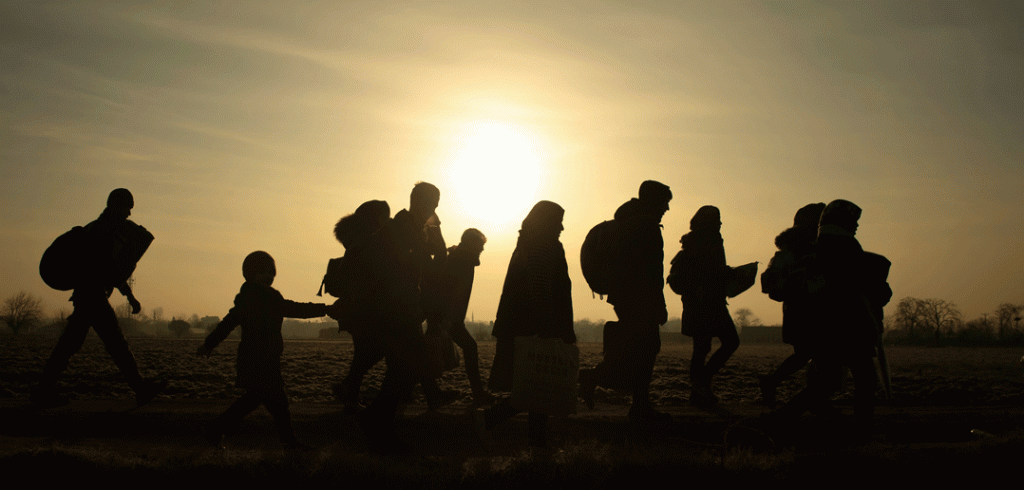Three Fordham professors are leading a new initiative to deeply engage the Fordham community in the ongoing global migration crisis.
“The Initiative on Migrants, Migration and Human Dignity” is spearheaded by Assistant Professor of Theology Leo Guardado; Associate Professor of Spanish, Carey Kasten; and Associate Professor of Theology, Jim McCartin. The professors recently received a $200,000 grant for their work from the Cummings Foundation, a Massachusetts-based non-profit.
According to the UN Refugee Agency, in 2022, over 100 million people are forcibly displaced worldwide by conflict, poverty, and human rights violations, an increase of more than 10 million individuals from 2021.
The grant will provide funding for a two-year pilot program, based at Fordham College at Lincoln Center, that aims to “cultivate student leaders committed to becoming activists, policy-makers, and researchers who are dedicated to affirming the human dignity of migrants and prepared to address complex challenges related to migration in U.S. society into the future,” according to the professors’ proposal.
As a first-generation immigrant, Guardado knows the migrant experience intimately. He made the difficult journey across the border with his mother as a child when he was just 9 from their remote mountain town in El Salvador. He has spent most of his young academic career working with NGOs and churches on the US-Mexican border helping migrants detained by ICE and those seeking sanctuary.
“I’ve been at Fordham for four years. When I got to New York, it felt like there wasn’t much at Fordham in terms of long-term sustainable engagement with migration,” said Guardado.
“My vision was building this interdisciplinary team of scholars thinking together and bringing disciplines and critical thinking from the academy to bear on the questions that the people on the front lines, the activists, the pastoral workers, the NGOs, have,” he said, explaining his inspiration for the proposal.
“Then we can develop relationships at the border and locally where a community group says, listen, ‘we, we need data on this because if we have data on this, maybe we can file a lawsuit. Maybe we can create an advocacy campaign.’ Here are the tools that we need to do that. Here’s the expertise that we need to make this happen.”
As part of the grant, faculty and students will partake in immersive workshops on current immigration issues, trips to the border, internships with migrant organizations like the Kino Border Initiative and LSA Family Services (two of the grant’s main partners), and several courses that are refocusing their curriculum to incorporate community-engaged learning. Arts and Sciences courses like the Politics of Immigration, and Global Health and Psychosocial Humanitarian Aid will offer new opportunities for students to get out of the classroom and into the community to interact directly with New York City migrant communities and organizations working on the border.
For Kasten, it was a trip to the border in 2019 that really sparked her desire to help create a more hands-on learning approach to immigration issues.
“I teach Spanish in the modern languages department. And my research, when I came to Fordham, was really about contemporary Spain,” Kasten said.
“I started teaching a bit more about migration realities in New York City, and kept wondering how to bring that into my research. In 2019, I went to the border with a group of faculty on a trip that professor McCartin was leading. It was through that I started thinking more deeply about connecting my research work to migration.”
McCartin envisioned the grant as an opportunity to connect Fordham faculty and students more directly with the University’s mission.
“This is a Jesuit institution, and my work is substantially about trying to invite all sorts of faculty members at Fordham—Catholic, Jewish, nonbelievers, Buddhist, etc.—to find ways to connect more with Fordham’s mission,” McCartin said. “So, the idea is this will not only enhance the experience of their work, but that will also redound to the mission of the University more.”
A major component of the initiative is what McCartin, Kasten, and Guardado refer to as “accompaniment.” The trio describes this practice as being there, side by side, and immersing students and faculty within migrant communities, so they can just absorb, without trying to critique or problem-solve.
They see accompaniment as a crucial component, but also as one of the greatest challenges and possibilities of the program.
“Since we are not located close to the border, it will look more like immersions for now, with groups of faculty going to the border for short trips,” said Guardado.
Much of the direct accompaniment work students are doing now involves hands-on interactions with recent migrants to New York City, many of whom arrived this fall on the buses sent from Texas and Florida. Through LSA Family Services, they have been working with a mostly Mexican population in East Harlem, helping them begin their asylum cases and assisting with direct needs like food, clothing, etc., Kasten said. Student interns are also helping families navigate the high school and college admissions processes.
“The longer-term accompaniment will come when students do their summer internship and spend months with these communities,” Guardado added.
“Accompaniment really means walking together, simply spending time together, and just really listening and learning from humanitarian workers and migrants on their journey. They will teach us what Fordham can do to support their struggle.”
–by Jonathan Schienberg


